初中情态动词表推测的用法及练习(经典)
初中英语语法之表推测情态动词用法和练习
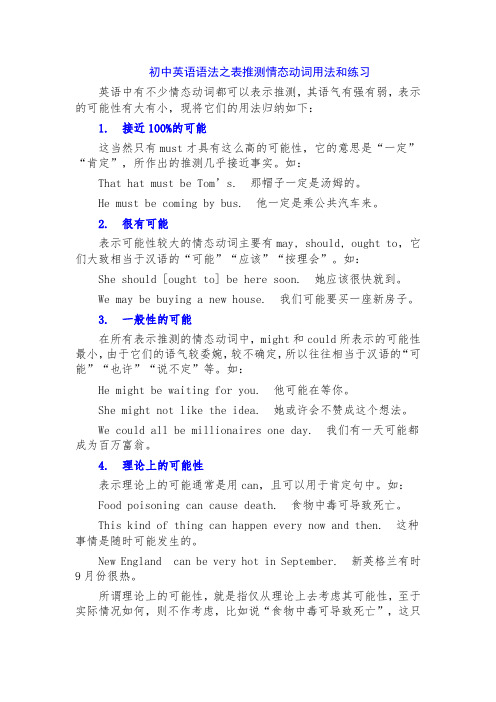
初中英语语法之表推测情态动词用法和练习英语中有不少情态动词都可以表示推测,其语气有强有弱,表示的可能性有大有小,现将它们的用法归纳如下:1. 接近100%的可能这当然只有must才具有这么高的可能性,它的意思是“一定”“肯定”,所作出的推测几乎接近事实。
如:That hat must be Tom’s. 那帽子一定是汤姆的。
He must be coming by bus. 他一定是乘公共汽车来。
2. 很有可能表示可能性较大的情态动词主要有may, should, ought to,它们大致相当于汉语的“可能”“应该”“按理会”。
如:She should [ought to] be here soon. 她应该很快就到。
We may be buying a new house. 我们可能要买一座新房子。
3. 一般性的可能在所有表示推测的情态动词中,might和could所表示的可能性最小,由于它们的语气较委婉,较不确定,所以往往相当于汉语的“可能”“也许”“说不定”等。
如:He might be waiting for you. 他可能在等你。
She might not like the idea. 她或许会不赞成这个想法。
We could all be millionaires one day. 我们有一天可能都成为百万富翁。
4. 理论上的可能性表示理论上的可能通常是用can,且可以用于肯定句中。
如:Food poisoning can cause death. 食物中毒可导致死亡。
This kind of thing can happen every now and then. 这种事情是随时可能发生的。
New England can be very hot in September. 新英格兰有时9月份很热。
所谓理论上的可能性,就是指仅从理论上去考虑其可能性,至于实际情况如何,则不作考虑,比如说“食物中毒可导致死亡”,这只是理论上的一种推断,至于某人某次食物中毒了,他是否会死亡,则不在考虑之列,所以说,这种推测是非常“宏观”的!5. 表示对过去情况作推测如果表示对已经发生的情况作推测,不能用“情态动词+动词原形”,也不能用“情态动词的过去式+动词原形”,而是要使用“情态动词+动词完成式”。
中考英语情态动词推测基础练习题40题(带答案)

中考英语情态动词推测基础练习题40题(带答案)1.There is a loud noise coming from the next room. It must be Tom. He is the only one there.A.must beB.can't beC.could beD.might be答案解析:A。
“must be”表示肯定的推测,根据题干中“There is a loud noise coming from the next room. He is the only one there.”可知,有很大的噪音从隔壁房间传来,并且他是那里唯一的一个人,所以可以肯定是汤姆。
“can't be”表示否定的推测,不符合题意;“could be”和“might be”表示可能性较小的推测,也不符合题意。
2.The book on the table isn't mine. It can't be mine.A.must beB.can't beC.could beD.might be答案解析:B。
“can't be”表示否定的推测,根据题干“The book on the table isn't mine.”可知,桌子上的书不是我的,所以用“can't be”。
“must be”表示肯定的推测,不符合题意;“could be”和“might be”表示可能性较小的推测,也不符合题意。
3.Look at that girl. She is singing so beautifully. She could be aprofessional singer.A.must beB.can't beC.could beD.might be答案解析:C。
“could be”表示可能性较大的推测,根据题干“Look at that girl. She is singing so beautifully.”可知,那个女孩唱歌很好听,有可能是专业歌手。
情态动词表推测用法总结及专项练习

情态动词表推测用法总结及专项练习第一篇:情态动词表推测用法总结及专项练习情态动词表推测用法总结及专项练习1.can / could用于表推测的用法(1)从使用句型上看,can 通常只用于否定句或疑问句,一般不用于肯定句,而could 可用于肯定句、否定句和疑问句。
两者没有时间上的差别,只是could 比 can 更委婉,更不确定。
如:It can’t [couldn’t] be true.那不可能是真的。
What can [could] they be doing? 他们会在干什么呢? We could go there this summer.今年夏天我们可能要去那儿。
注:can 有时也用于肯定句中表示推测,主要用于表示理论上的可能性(即从理论上看是可能的,但实际未必会发生),或表示“有时”之意。
如:Even experienced teachers can make mistakes.即使是有经验的教师也可能出错。
She can be very unpleasant.她有时很令人讨厌。
(2)从时间关系看,对现在或将来情况作推测,后接动词原形;对正在进行的情况作推测,后接 be doing 结构;对过去情况作推测,后接动词完成式。
如:He could have gone home.他可能已经回家了。
He can’t [couldn’t] have understood.他不可能理解了。
Why does he know this? Can [Could] someone have told him about it? 他怎么知道? 会是哪个人告诉他了吗?(3)“could+完成式”除表示对过去的推测外,还有以下重要用法:① 表示过去没有实现的可能性,常译为“本来可以”。
如: I could have lent you the money.Why didn’t you ask me? 我本来可以借这笔钱给你的。
初一英语情态动词推测用法练习题40题含答案解析

初一英语情态动词推测用法练习题40题含答案解析1.There must be a lot of students in the library. It's very quiet.must becan't bemight becould be答案解析:must be。
“must be”表示肯定的推测,意思是“一定是”。
图书馆很安静,通常情况下安静的地方可能有很多学生在学习,所以用“must be”比较合理。
“can't be”表示否定的推测,不符合题意。
“might be”和“could be”表示可能性较小的推测,没有“must be”肯定。
2.The boy in the classroom must be Tom. He is the only one who wears a blue shirt today.must becan't bemight becould be答案解析:must be。
题干中明确指出男孩是唯一穿蓝色衬衫的人,所以肯定是Tom,用“must be”。
“can't be”否定推测不符合。
“might be”和“could be”可能性小,不如“must be”确定。
3.There must be some books on the desk. I saw the teacher put them there.must becan't bemight becould be答案解析:must be。
看到老师把书放在桌子上了,所以肯定有书在桌子上,用“must be”。
“can't be”不对。
“might be”和“could be”表示不确定,这里已经确定看到老师放书了。
4.The girl who is singing must be Lily. She has a beautiful voice.must becan't bemight becould be答案解析:must be。
初一英语情态动词推测用法练习题30题(带答案)

初一英语情态动词推测用法练习题30题(带答案)1. The door is open. Someone ____ be in the room.A.mustB.canC.mayD.could答案解析:C。
“must”表示肯定的推测,语气非常强;“can”表示理论上的可能性;“may”表示有可能,语气较弱;“could”表示过去的可能性或委婉语气。
在这个场景中,门开着只能说明可能有人在房间,所以选择“may”。
2. There is a lot of noise coming from the classroom. The students ____ be having a discussion.A.mustB.canC.mayD.could答案解析:A。
“must”在这里表示比较肯定的推测,因为有很多噪音从教室传来,很有可能是学生们在进行讨论。
“can”和“could”表示可能性较小,“may”语气较弱。
3. Tom is not in the classroom. He ____ be in the library.A.mustB.canD.could答案解析:C。
“may”表示有可能,因为汤姆不在教室,只是有可能在图书馆,不能确定,所以选择“may”。
“must”语气太强,“can”和“could”也不太符合这个场景。
4. The light in the office is on. Someone ____ be working there.A.mustB.canC.mayD.could答案解析:C。
灯亮着只能说明有可能有人在办公室工作,“may”语气较弱,符合这个场景。
“must”太肯定,“can”和“could”也不太恰当。
5. There are some footprints on the ground. Someone ____ have walked here.A.mustB.canC.mayD.could答案解析:C。
初中情态动词表推测的用法及练习(经典)

(一)情态动词表推测的1.在肯定句中一般用 must (一定),may (可能),might (也许,或许)。
( 1 ) The photo must be Lu ’s, those must be their parents.( 2 ) The policeman may know the way to that school.( 3 ) The notebook may belong to Jim, it ’s on his desk.( 4 ) If you have any idea where it might be, please call me.2.否定句中用 can’t / couldn’t(不可能 ), may not/might not( 可能不)。
( 1 )It can’t/couldn’t be the headmaster. He has gone to America.这不可能是校长,他去美国了。
(2 ) The doctor may not/might not be in the hospital now,It’s nearly six o’clock.3.疑问句中用 can/could (能……?)。
( 1 ) Could he have finished the task?他可能把任务完成了吗?( 2 ) Can he be at home now?他现在能在家吗?注:以上三种句式中情态动词的语气按程度都是依次递减的。
might, could 并非 may, can 的过去式,而表示语气较为委婉或可能性较小。
(二)情态动词表推测的1.对现在正在进行的动作推测时,用“情态动词 + be +doing”。
例: He must / may / might / could be listening to the radio now. 他一定/可能/ 也许正在听收音机。
情态动词表推测的讲解及练习题

九年级英语表推测语气的讲解与练习表推测时,英语中只使用must,may,might,may not和can't。
这五个表达的语气依次递减:情态动词must, can, could, may, might表推测的用法情态动词中的must, can, could, may, might都表推测。
其中must的可能性最大,can / could次之,may / might最小。
具体用法如下:1.must的用法(1)表示推测“可能性”时,意思是“一定、准是”,语气较肯定,较有把握。
He must be American. = It is certain that he is American. 他准是个美国人。
(2)must表推测只能用于肯定句。
如果要表示“一定不、肯定不”的意思时,应用can’t,如询问某种可能时,应用can。
He must know my address. 他肯定知道我的地址。
(一定)He can’t know my address. 他肯定不知道我的地址。
(一定不)Can he know my address? 他知道我的地址吗?(询问可能性)(3)must表示推测时,可以推测现在/正在发生的动作/过去发生的动作。
He must have a car now. (现在)他一定有辆小汽车。
He must be doing his exercises in the classroom.(正在进行)他一定在教室里做练习。
He must have finished the work.(过去发生)他一定已完成了工作。
注:must表示推测时很少用于将来的情况。
一般不用He must come tomorrow.可用It`s certain / I’m sure that he will come tomorrow.(4)在反意疑问句中,当附属部分含有表示推测意义的must时,疑问部分的助动词应与must 后面的动词在非推测情况下的用法保持一致。
(完整版)初中情态动词表推测的用法及练习(经典).docx
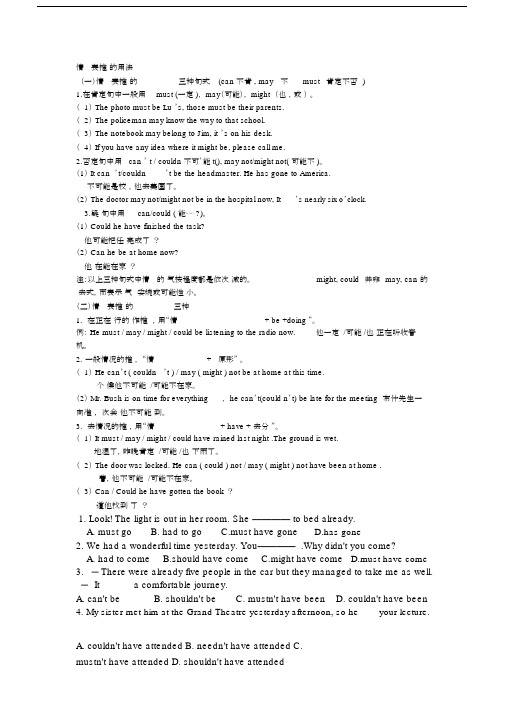
情表推的用法(一)情表推的三种句式(can 不肯 , may不must肯定不否)1.在肯定句中一般用must (一定 ), may(可能), might (也,或)。
(1) The photo must be Lu ’s, those must be their parents.(2) The policeman may know the way to that school.(3) The notebook may belong to Jim, it ’s on his desk.(4) If you have any idea where it might be, please call me.2.否定句中用can ’ t / couldn 不可’能t(), may not/might not( 可能不 )。
(1) It can ’t/couldn’t be the headmaster. He has gone to America.不可能是校,他去美国了。
(2) The doctor may not/might not be in the hospital now, It’s nearly six o’clock.3.疑句中用can/could ( 能⋯⋯ ?)。
(1) Could he have finished the task?他可能把任完成了?(2) Can he be at home now?他在能在家?注:以上三种句式中情的气按程度都是依次减的。
might, could并非may, can的去式,而表示气委婉或可能性小。
(二)情表推的三种1.在正在行的作推,用“情+ be +doing ”。
/可能 /也正在听收音例: He must / may / might / could be listening to the radio now.他一定机。
2.一般情况的推,“情+ 原形”。
表推测的情态动词及其用法
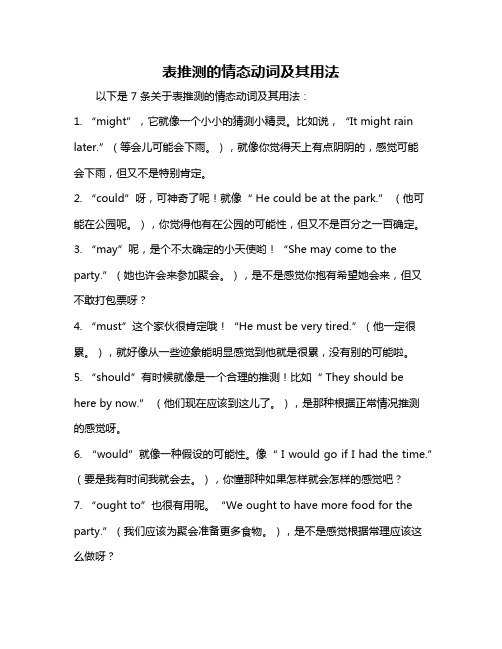
表推测的情态动词及其用法以下是 7 条关于表推测的情态动词及其用法:1. “might”,它就像一个小小的猜测小精灵。
比如说,“It might rain later.”(等会儿可能会下雨。
),就像你觉得天上有点阴阴的,感觉可能会下雨,但又不是特别肯定。
2. “could”呀,可神奇了呢!就像“ He could be at the park.” (他可能在公园呢。
),你觉得他有在公园的可能性,但又不是百分之一百确定。
3. “may”呢,是个不太确定的小天使哟!“She may come to the party.”(她也许会来参加聚会。
),是不是感觉你抱有希望她会来,但又不敢打包票呀?4. “must”这个家伙很肯定哦!“He must be very tired.”(他一定很累。
),就好像从一些迹象能明显感觉到他就是很累,没有别的可能啦。
5. “should”有时候就像是一个合理的推测!比如“ They should behere by now.” (他们现在应该到这儿了。
),是那种根据正常情况推测的感觉呀。
6. “would”就像一种假设的可能性。
像“ I would go if I had the time.” (要是我有时间我就会去。
),你懂那种如果怎样就会怎样的感觉吧?7. “ought to”也很有用呢。
“We ought to have more food for the party.”(我们应该为聚会准备更多食物。
),是不是感觉根据常理应该这么做呀?我觉得啊,这些情态动词让我们的表达更丰富、更灵活,能更好地传达我们心中那种不确定或者推测的感觉,真是太奇妙啦!。
初三情态动词表推测
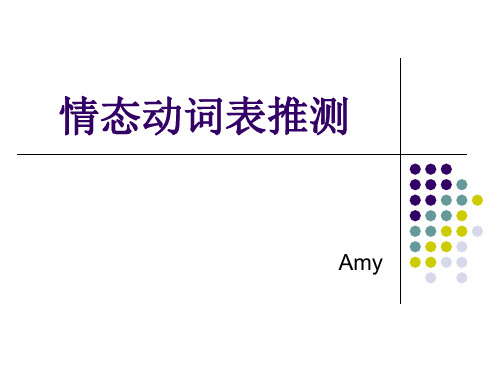
Amy
教学任务:
1.表推测的情态动词 2.表肯定推测的用法 3.表否定推测的用法 4.表不确定性推测的用法 5.情态动词表推测习题
Translate:
He must know the answer. 他一定知道答案。 He can’t know the answer. 他肯定不知道答案
Summer Palace?
— Sorry, I am not sure.It _____ be.
A.might B.will C.must
D.can
2.— Isn’t that Ann’s husband over there?
— No, it _____ be him — I’m sure he doesn’t
wear glasses.
A.can’t
B.must not
C.won’t D.may not
Choose the correct answer.
3.You ____ be tired — you’ve only been working
for an hour.
A.must not B.won’t
C.can’t
D.may not
4.— Is John coming by train?
— He should, but he _____ not.He likes driving
his car.
A.must
B.can
C.need
D.may
Exercises
5.—Mum, Ive signed for the box.What's in it? —I'm not sure.It _____be a present from your
表推测的情态动词

3. “can/could not +have +done”“过 去 不可能做了某事” 她不能去你家,她不知道你的地址。 eg. She can not have been to your house;she does not know your address.
4. may/might have done“过去或许做 过某事” may/might not have done “过去或 许 没有做过某事” eg. I can’t find my key, I might have left it at home. He might not have got your letter.
二.“情态动词+have done” 的用法。 1.must have done “过去一定做了某事” 表示对过去的一种肯定性推测。 eg. She must have gone by bus. It must have rained last night, for the road is quite muddy.
2. can/could have+done“过去可能 做了某事”, “could have+done”也可表示‘‘过 去本可以做某事但实际上却没有做” eg. He was not at home last night, he could have gone to the cinema. I could have finished my homework last night, but I was too sleepy.
5.ought to/should have done,”表示本应该 做某事,而事实上并没有做”。 否定句表示“ 本不该做某事而实际上做 了”。 你在实验中本应该更仔细些的 You ought to/should have been more careful in this experiment. 他不应该把那些旧衣服扔了。 He ought not to have thrown the old clothes away.
初中英语-情态动词表示推测的用法及专项练习

情态动词must, can, could, may, might表推测的用法:1.用于肯定的推测:must > can > could > may > might1)其中must语气最强最肯定,只用于肯定句,意为“一定,准是,必然会”。
You haven’t eaten anything since this morning,you must be hungry.2) can次之一般表示理论上可能性,但实际未必会发生。
意为“可能”。
Even experienced teachers can make mistakes.3) could再次之,意为“可能”My book has disappeared. Who could have taken it?4) may / might语气最弱,表示无把握的推测,意为“可能,或许”。
(might比may 更加不肯定,更无把握)。
例如:He may/might be writing a letter now, but I’m not sure.2. 用于否定的推测can’t >couldn’t > may not > might not1)can’t用于否定推测,是语气最强的否定推测,意为“不可能,一定不(是)”。
He can’t her here because she is in hospital.2)couldn’t 比can’t 语气弱,表示某事不可能真实,但自己也不是很肯定。
It couldn’t possibly be Tom. He should be at school now.3). may not/ might not表示否定推测时,表示(无把握的)否定推测,意为“可能/或许不”。
例如:It’ still early. He may/might not come back.3.用于疑问句的推测,一般只用can/couldWho can it be at the door? Can it be Tom?情态动词中的must, can, could, may, might都表推测。
情态动词表推测例句

情态动词表推测例句1. 他今天没来上班,说不定被外星人绑架了呢,那外星人可能看他长得像个圆滚滚的土豆,就想带回去研究研究。
2. 小李这么久没回消息,也许他掉进了一个全是棉花糖的大坑里,正忙着吃棉花糖没空看手机呢,他可能觉得那棉花糖像云朵一样美味。
3. 我刚看到那只猫走路一瘸一拐的,它大概是和老鼠打架的时候被老鼠揍了,那老鼠没准像个武林高手,把猫打得毫无还手之力。
4. 老王今天穿得这么正式,他也许是要去参加国王的宴会呢,他可能觉得自己是城堡里最帅的骑士,虽然他长得像个冬瓜。
5. 这蛋糕怎么少了一块,说不定是家里的小精灵偷吃了,那小精灵可能像个小馋虫,看到蛋糕就走不动道。
6. 我的笔不见了,它可能是被文具王国的小贼偷走了,那小贼也许看我的笔像个闪闪发光的魔法棒。
7. 小张上课一直打瞌睡,他大概是昨晚被一群蚊子吵得没睡好,那些蚊子没准像一群轰炸机在他耳边嗡嗡叫。
8. 这棵树的叶子怎么都黄了,也许是它听了太多悲伤的故事,就像人听多了会哭一样,它可能是树界的林黛玉。
9. 小赵跑得那么快,他说不定是被后面有只像恐龙那么大的狗在追,所以才拼命狂奔。
10. 那朵花一直不开,它可能是在等一个像白马王子一样的蜜蜂来亲吻它,才肯绽放呢。
11. 我闻到一股怪味,这屋里也许有个像臭豆腐精一样的小妖怪在捣乱。
12. 他头发乱得像个鸟窝,可能是被一阵像龙卷风一样的大风吹过。
13. 这个手机突然死机了,说不定是它被手机病毒入侵了,那病毒可能像个小恶魔在里面搞破坏。
14. 那只鸟一直在窗前叫,它大概是想告诉我有宝藏,它可能觉得我像个大冒险家。
15. 我的鞋怎么破了个洞,也许是被一只像剪刀一样锋利的小螃蟹夹破的。
16. 他笑得那么大声,可能是听到了一个像原子弹爆炸一样搞笑的笑话。
17. 这个房子看起来阴森森的,里面也许住着像幽灵一样的东西,它可能像个黑影在房子里飘来飘去。
18. 那片云的形状好奇怪,它可能是被一个像超级艺术家一样的神仙捏成这样的。
初中情态动词表的推测用法猜测及练习(经典)

初中情态动词表的推测用法猜测及练习(经典)在初中语法研究中,情态动词是一个重要的部分。
情态动词除了表示能力、可能性、允许性等含义外,还可用于表达推测。
本篇文档将介绍初中情态动词表的推测用法,并提供一些练。
情态动词表的推测用法猜测情态动词用于推测时,常常表示根据已有的信息或证据得出的合理猜测或推断。
以下是一些常见的情态动词及其推测用法:1. can: 表示推测,例如:"He can be at home."(他可能在家。
)can: 表示推测,例如:"He can be at home."(他可能在家。
)2. could: 表示推测,通常比can稍微更不确定,例如:"She could be busy."(她可能忙。
)could: 表示推测,通常比can稍微更不确定,例如:"She could be busy."(她可能忙。
)3. may/might: 表示推测,表示某种可能性,例如:"It may rain tomorrow."(明天可能会下雨。
)may/might: 表示推测,表示某种可能性,例如:"It may rain tomorrow."(明天可能会下雨。
)4. must: 表示根据已有的证据或情况必然发生的推测,例如:"He must be tired."(他一定很累。
)must: 表示根据已有的证据或情况必然发生的推测,例如:"He must be tired."(他一定很累。
)5. should: 表示合理的推测或建议,例如:"They should be here soon."(他们应该很快就到了。
)should: 表示合理的推测或建议,例如:"They should be here soon."(他们应该很快就到了。
(完整word版)情态动词表推测用法总结和专项练习,文档.doc
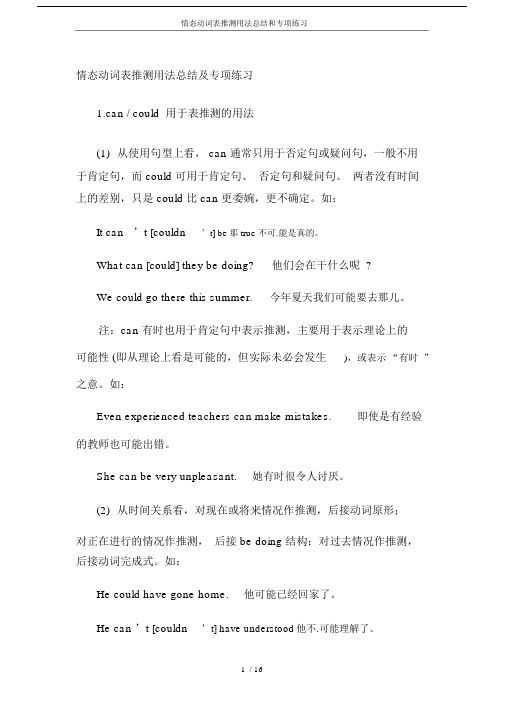
情态动词表推测用法总结和专项练习情态动词表推测用法总结及专项练习1.can / could 用于表推测的用法(1)从使用句型上看, can 通常只用于否定句或疑问句,一般不用于肯定句,而 could 可用于肯定句、否定句和疑问句。
两者没有时间上的差别,只是 could 比 can 更委婉,更不确定。
如:It can’t [couldn’t] be那true不可.能是真的。
What can [could] they be doing?他们会在干什么呢?We could go there this summer.今年夏天我们可能要去那儿。
注:can 有时也用于肯定句中表示推测,主要用于表示理论上的可能性 (即从理论上看是可能的,但实际未必会发生),或表示“有时”之意。
如:Even experienced teachers can make mistakes.即使是有经验的教师也可能出错。
She can be very unpleasant.她有时很令人讨厌。
(2)从时间关系看,对现在或将来情况作推测,后接动词原形;对正在进行的情况作推测,后接 be doing 结构;对过去情况作推测,后接动词完成式。
如:He could have gone home.他可能已经回家了。
He can ’t [couldn’t] have understood他不.可能理解了。
Why does he know this? Can [Could] someone have told him about it?他怎么知道?会是哪个人告诉他了吗?(3)“could+完成式”除表示对过去的推测外,还有以下重要用法:① 表示过去没有实现的可能性,常译为“本来可以”。
如:I could have lent you the money.Why didn’t you ask me?我本来可以借这笔钱给你的。
你为什么不向我提出?② 用来委婉地责备某人过去应该做某事而没有去做,常译为“本来应该”。
初中情态动词表的用法推测及练习(经典)

初中情态动词表的用法推测及练习(经典)本文档旨在提供初中学生关于情态动词用法推测及练方面的指导。
下方是一份经典的初中情态动词表,供学生参考和练。
用法推测Can / Could- 表示能力或可能性:He [can/could] swim very fast. (他会游泳很快。
)- 表示请求或允许:[Can/Could] you help me with the homework? (你能帮我做作业吗?)May / Might- 表示可能性或允许:We [may/might] go to the ___(我们明天可能去公园。
)- 表示推测或建议:He [may/might] be late for the meeting. (他可能会迟到开会。
)___- 表示将来的行为:I [shall/should] ___我这个周末会去看望我祖父母。
)- 表示义务或建议:You [should] study hard for the exam. (你应该为考试而努力研究。
)Will / Would- 表示将来的行动或意愿:He [will/would] buy a new car. (他想买一辆新车。
)- 表示请求或邀请:[Will/Would] you please pass me the salt? (请你把盐递给我好吗?)Must- 表示必须性或推测:I [must] ___ before going out. (我必须在出门之前完成作业。
)- 表示肯定的推测:He [must] be tired after running for so long. (他跑了这么久肯定累了。
)___- 表示应该或建议:You [ought to] apologize to your friend. (你应该向你的朋友道歉。
)练根据上述情态动词的用法推测,完成以下句子:1. I __________ swim when I was five years old. (我五岁的时候能游泳。
- 1、下载文档前请自行甄别文档内容的完整性,平台不提供额外的编辑、内容补充、找答案等附加服务。
- 2、"仅部分预览"的文档,不可在线预览部分如存在完整性等问题,可反馈申请退款(可完整预览的文档不适用该条件!)。
- 3、如文档侵犯您的权益,请联系客服反馈,我们会尽快为您处理(人工客服工作时间:9:00-18:30)。
情态动词表推测的用法
(一)情态动词表推测的三种句式(can不肯, may 不问must 肯定不否问)
1.在肯定句中一般用must (一定),may(可能),might (也许,或许)。
(1)The photo must be Lu’s, those must be their parents.
(2)The policeman may know the way to that school.
(3)The notebook may belong to Jim, it’s on his desk.
(4)If you have any idea where it might be, please call me.
2.否定句中用can’t / couldn’t(不可能), may not/might not(可能不)。
(1)It can’t/couldn’t be the headmaster. He has gone to America.
这不可能是校长,他去美国了。
(2)The doctor may not/might not be in the hospital now, It’s nearly six o’clock.
3.疑问句中用can/could (能……?)。
(1)Could he have finished the task?
他可能把任务完成了吗?
(2)Can he be at home now?
他现在能在家吗?
注:以上三种句式中情态动词的语气按程度都是依次递减的。
might, could并非may, can的过去式,而表示语气较为委婉或可能性较小。
(二)情态动词表推测的三种时态
1.对现在正在进行的动作推测时,用“情态动词+ be +doing”。
例:He must / may / might / could be listening to the radio now. 他一定/可能/也许正在听收音机。
2.对一般情况的推测,“情态动词+ 动词原形”。
(1)He can’t ( couldn’t ) / may ( might ) not be at home at this time.
这个时候他不可能/可能不在家。
(2)Mr. Bush is on time for everything,he can’t (could n’t) be late for the meeting布什先生一向准时,这次会议他不可能迟到。
3.对过去情况的推测,用“情态动词+ have +过去分词”。
(1)It must / may / might / could have rained last night .The ground is wet.
地湿了,昨晚肯定/可能/也许下雨了。
(2)The door was locked. He can ( could ) not / may ( might ) not have been at home .
门锁着,他不可能/可能不在家。
(3)Can / Could he have gotten the book?
难道他找到书了吗?
1. Look! The light is out in her room. She ———— to bed already.
A. must go
B. had to go
C.must have gone
D.has gone
2. We had a wonderful time yesterday. You ———— .Why didn't you come?
A. had to come
B.should have come
C.might have come
D.must have come
3. ─There were already five people in the car but they managed to take me as well.
─ It______ a comfortable journey.
A. can't be
B. shouldn't be
C. mustn't have been
D. couldn't have been
4. My sister met him at the Grand Theatre yesterday afternoon, so he ___ your lecture.
A. couldn't have attended
B. needn't have attended
C. mustn't have attended
D. shouldn't have attended
5. I was really anxious about you. You _____ home without a word.
A. mustn't leave
B. Shouldn't have left
C. Couldn't have left
D. needn't leave
6. Oh, I’m not feeling well in the stomach,I_____ so much fried chicken just now.
A. s houldn’t cut
B. mustn’t have eaten
C. shouldn’t have eaten
D. mustn’t eat
7. Mr.White _____ at 8:30 for the meeting, but he didn’t’ show up.
A. should have arrived
B. should arrive
C. should have had arrived
D. should be arriving
8. You ______ be tired - you've only been working for an hour.
A. must not
B. won' t
C. can' t
D. may not
9. - Isn' t that Ann's husband over there?
- No, it _______ be him -I'm sure he doesn't wear glasses.
A. can't
B. must not
C. won't
D. may not
10. There ____ be any difficulty about passing the road test since you have practised a lot in the driving school.
A . mustn’t B. shan’t C. shouldn’t D.needn’t
11. I was on the highway when this car went past followed by a police car. They
______ at lease 150 km an hour.
A. should have been doing
B. must have been doing
C. could have done
D. would have done
12. He _____ have completed his work; otherwi se, he wouldn’t be enjoying himself by the seaside.
A. should
B. must
C. wouldn’t
D. can’t
13. ---- The woman biologist stayed in Africa studying wild animals for 13 years before she returned.---- Oh, dear! She _______ a lot of difficulties!
A. may go through
B. might go through
C. ought to have gone through
D. must have gone through
14. This cake is very sweet. You __________ a lot of sugar in it.
A.should put B.could have put C.might put D.must have put
15. —Catherine, I have cleaned the room for you.
—Thanks. You it. I could manage it myself.
A.needn’t do B.needn’t have done C.mustn’t do D.shouldn’t have done 16.—Tom is never late for work. Why is he absent today?
—Something ________ to him.
A.must happen B.should have happened
C.could have happened D.must have happened。
